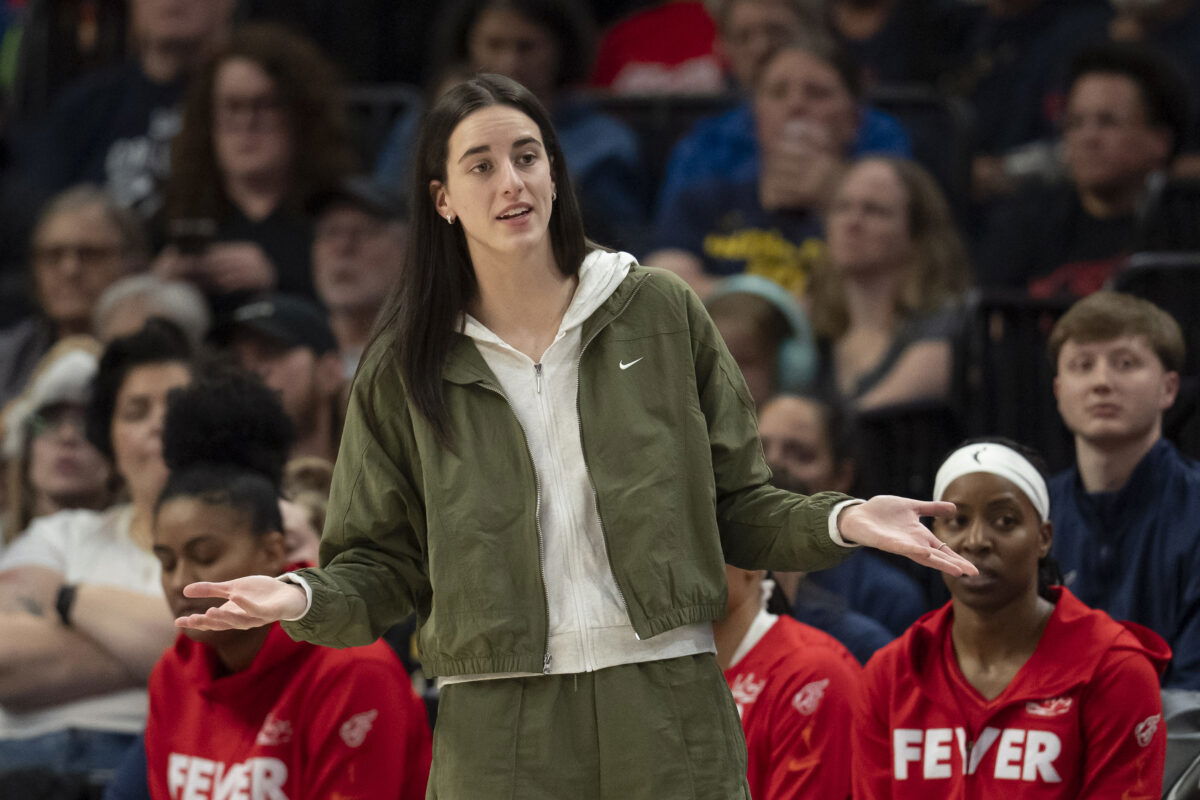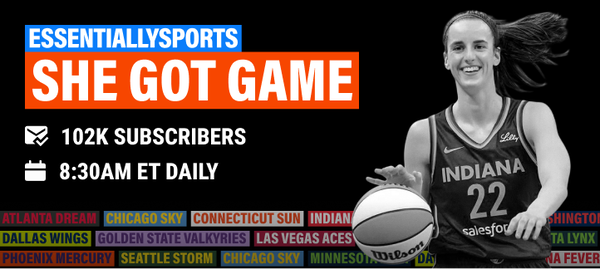
Imago
Aug 24, 2025; Minneapolis, Minnesota, USA; Indiana Fever guard Caitlin Clark (22) looks on from the bench against the Minnesota Lynx in the second half at Target Center. Mandatory Credit: Jesse Johnson-Imagn Images

Imago
Aug 24, 2025; Minneapolis, Minnesota, USA; Indiana Fever guard Caitlin Clark (22) looks on from the bench against the Minnesota Lynx in the second half at Target Center. Mandatory Credit: Jesse Johnson-Imagn Images
As if Caitlin Clark’s trophy case wasn’t already overflowing, she added another feather a couple of months back: Nike signature athlete. “Nike’s signature roster features all-time greats, and I am incredibly proud to join some of the best athletes in the world,” Clark said. Her inclusion was historic, but it raised an uncomfortable question: Is Clark receiving the same treatment that past legends enjoyed? And if not, who is responsible?
Watch What’s Trending Now!
For many critics, including Barstool Sports founder Dave Portnoy, the answer is clear: WNBA Commissioner Cathy Engelbert. Speaking on Rachel DeMita’s channel, Portnoy dismissed the league’s long-standing defense of financial struggles. “It’s like, well, we haven’t made money for 15 years, 20 years, or whatever. That doesn’t matter. It is now. You have to take advantage of it now,” he argued.
He pointed out that the WNBA is currently experiencing unprecedented growth, with soaring viewership, record attendance, and a billion-dollar Disney media deal. Yet, doubts persist about whether players are being fairly compensated or adequately marketed.
Naturally, all fingers are being pointed towards Engelbert. Why, you ask? As Portnoy said on Rachel DeMita’s channel, “Commissioners are always in the middle and commissioners are always going to take the brunt of what the owners don’t want to feel.” Digging deeper, he questioned the transparency of the league’s finances. “We have no clue what the real numbers are when it comes to profit and loss. It’s all mixed in with the WNBA—I mean, the NBA. It’s super convoluted to actually figure out how much they’re making, how much they’re losing, and it’s in the owners’ interest not to really have the true numbers if they’re going up.”
Then he turned to Clark – our major topic, here. He recalled writing an article on CC’s Nike deal and said, “She got screwed.” And he didn’t hold back:
“If you look back at it, like the power of her and when her shoe comes out, like we’ll see what the sales are. They’re paying Devin Booker, I think, $40 million a year. So, in what universe is Devin Booker worth $40 million a year and Caitlin’s worth eight? It’s insane. So, it’s all there. It’s all up and they’re not taking advantage of it and clearly the players have lost faith in Cathy.”
To get the figures right, Clark agreed to an eight-year deal worth $28 million with Nike just days after the Fever made her the No. 1 overall pick. With those numbers, the gap is glaring, especially as we have seen the frenzy around Clark. The hype around her logo drop, the attention Caitlin Clark’s Kobe 5 Protro is drawing, and the petitions pushing for her signature deal all show the excitement building. This can’t all be a fluke, can it?
View this post on Instagram
The question is simple: why are major brands like Nike seemingly unwilling to invest in the face of your league? Are these stars just not marketed enough? To make the case worse, this all comes on the heels of Napheesa Collier sharing details of private conversations she allegedly had with Engelbert about player salaries. Collier highlighted how young stars like Clark and Angel Reese are driving millions in league revenue while earning less than $80,000 on their rookie contracts.
By contrast, the NBA’s No. 1 overall pick Cooper Flagg will make $13.8 million as a rookie. Collier claimed Engelbert’s response was shocking: “[Clark] should be grateful she makes $16 million off the court, because without the platform that the WNBA gives her, she wouldn’t make anything.” Statements like these are the opposite of what players and, really, any league observer expect from a commissioner genuinely looking out for its stars.
One of the biggest reasons why frustration has boiled over. The growing frustration from both players and WNBA allies isn’t random; it’s a direct reflection of leadership perceived as out of touch.
See, we admire all that she has done for this league over the past few years, but it’s also true that she runs the WNBA front office, and she represents the league in every negotiation, every public statement, every decision that affects these players. So, when people wonder why all the fire is aimed at Engelbert, it’s simple: if not her, then who?
And Clark, including almost all the big stars in the league, is very much in this fight, openly supporting Collier and the broader player push for fairness. Now we see she has more than a few reasons to do so.
Caitlin Clark stands with Napheesa Collier
Caitlin Clark, during her exit interview on Thursday, responded to the controversy sparked earlier this week by Collier. Collier had accused WNBA Commissioner Cathy Engelbert of dismissing player concerns during recent talks about officiating and salaries, as we already discussed.
While Clark said she hadn’t heard about Engelbert’s alleged remark that she should be “grateful” for her off-court earnings, she voiced strong support for Collier. “Phee made a lot of very valid points,” Clark said. “I have great respect for Phee, and Phee said it all. What people need to understand is that we need great leadership at this time across all levels. This is the most important moment in this league’s history, and we have to capitalize on it.”
Clark also noted she hasn’t had any direct contact with Engelbert since Collier’s statement went viral. Engelbert, in response, said she was “disheartened by how Napheesa characterized our conversations and league leadership.” So now with stars finally speaking out, the CBA clock ticking toward its October 31 expiration, the fan bases uniting and even media voices loudly weighing in (most of the time directly pointing fingers at Engelbert), the pressure on the WNBA commissioner has never been higher.
Every day that passes without decisive action risks further eroding the trust players have in league leadership. Sure, the league has built something special, but it all rests on the belief that leadership has the players’ best interests at heart. Anything less risks not just disappointment, but a fracture that could reverberate across every level of the WNBA.


